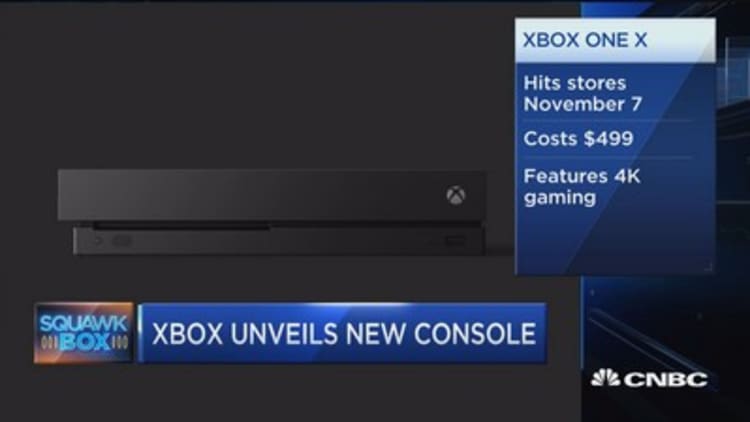
Before this console generation even got underway, Microsoft found itself in the unfamiliar position of having to play defense.
The Xbox 360 was a rousing success and the company had led the way in making the video game console a true living room component (by integrating Netflix into the system). It also pioneered online console gameplay and was a publisher favorite, often getting first shot at downloadable content for hot games.
But Sony reset the playing field with the PlayStation 4. To date, it has sold 60 million of the consoles worldwide. As for the Xbox One, no one knows, as Microsoft stopped giving sales updates in 2015. But software sales and a shift in publisher exclusives to Sony indicate the PlayStation 4 has a healthy lead over the Xbox One. Now Microsoft is hoping to get back in the fight.
On Sunday, the company publicly showed Xbox One X for the first time. Announced last year as "Project Scorpio," the beefed-up console will enable true 4K gaming and offer support for virtual reality headsets, while still being compatible with all existing Xbox One titles.
"We viewed compatibility as critical for Xbox One X," says Kareem Choudhry, corporate vice president of Xbox software engineering at Microsoft. "Right from the start, all Xbox One accessories and games will work with Xbox One X. … The game library you have today will be even better with Xbox One X with ... faster load times [and improved graphics]. Even if you haven't made the jump to a 4K TV yet, we made this Xbox for you."
It's Microsoft's most direct assault on Sony since the launch of this generation.
"Microsoft thinks this is a 15-round championship boxing match with Sony, so they're going to take some swings with [Xbox One X] and try to win some of the middle rounds against what they think is a slowing down PS4 market," says P.J. McNealy of Digital World Research.
Xbox One X's not a cheap system, though, even by video game standards. When it hits shelves this Nov. 7, it will cost $499. That's almost certain to scare off casual buyers and could even give the most dedicated hardcore gamers pause.
"We expect [Xbox One X] to underwhelm at retail, as has PS4 Pro, which costs $399," says Michael Pachter of Wedbush Securities.
Hardware is only part of the battle, of course. The key to any victory in the video game world is software sales. And while plenty of publishers voiced their support for Xbox One X at Microsoft's press event (which showcased 42 new games), exclusives like the company boasted last generation were nowhere to be found. And it's at least another year before the company will have a new installment in its flagship "Halo" series ready.
"There hasn't been a lot of really great software," says Ben Schachter of Macquarie Capital. "The exclusives from third parties aren't there. We need to see more interesting first-party exclusives or something special on the virtual reality/mixed reality side. ... You need to show people why there is a reason to upgrade."
Beyond its immediate impact on Microsoft's standing in the industry, the release of Xbox One X raises questions about the video game hardware world at large. Specifically, have the days of "next generation" consoles given way to regular hardware upgrades, much like the model Apple has formulated so well with the iPhone?
Microsoft has been pretty clear that could be the case, with Aaron Greenberg, head of Xbox games marketing, saying last year: "We think the future is without console generations."
That's a big bet — especially if Sony doesn't play along. And despite putting out the upgraded PlayStation 4 Pro last year, Microsoft's chief competitor doesn't seem eager to follow the same path.
"I still firmly believe the normal step change of a platform life cycle is very important," says Andrew House, global chief executive of Sony Interactive Entertainment, the company's video game division. "I think the fact that the technology resets mean you get to reset the medium every five to seven years and I still think that's very positive. Yes, you've got rising production values and often costs, but you do have the opportunity to essentially reinvent the medium and bring something new and different to it. ... I don't think we, as a category, should walk away from that."

